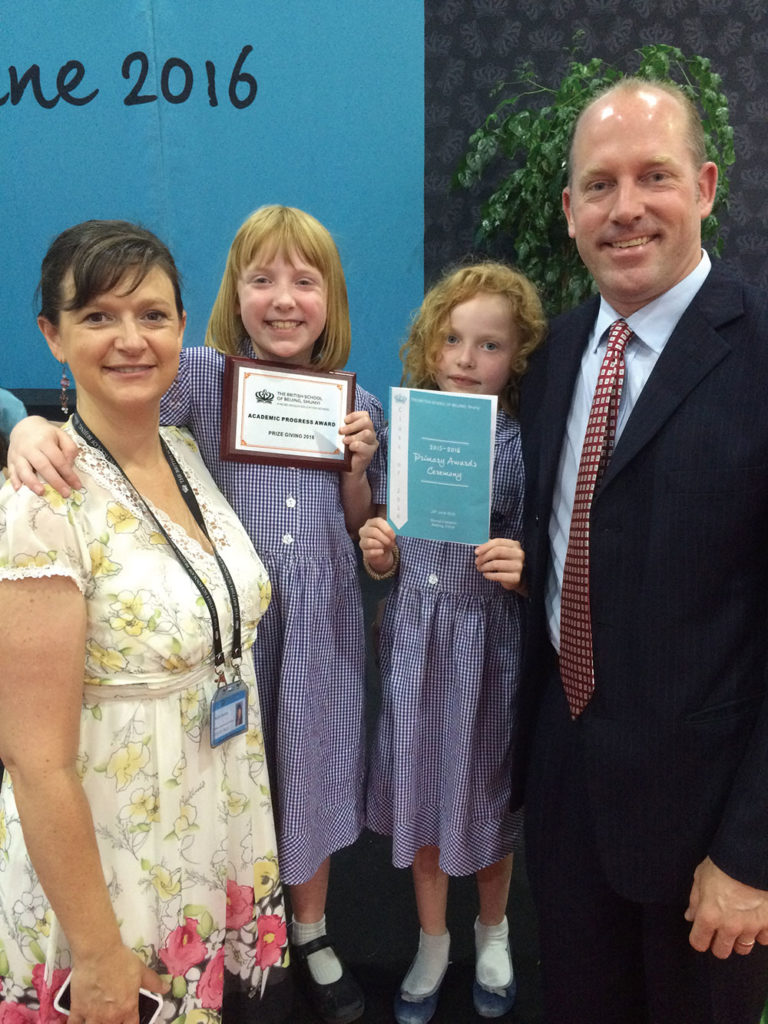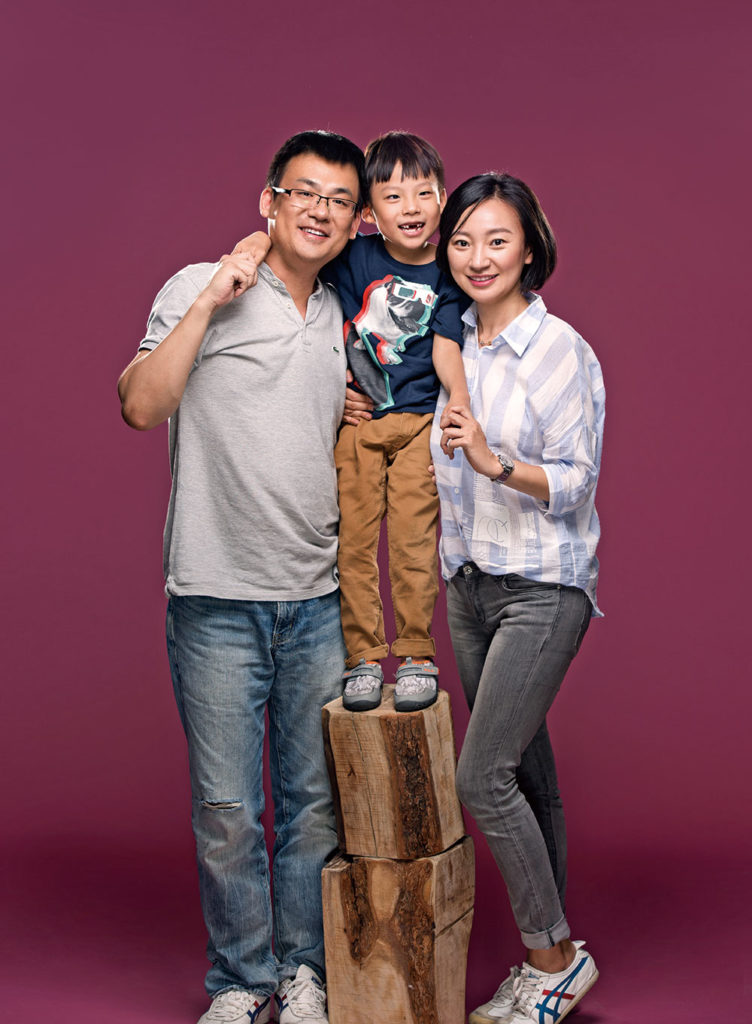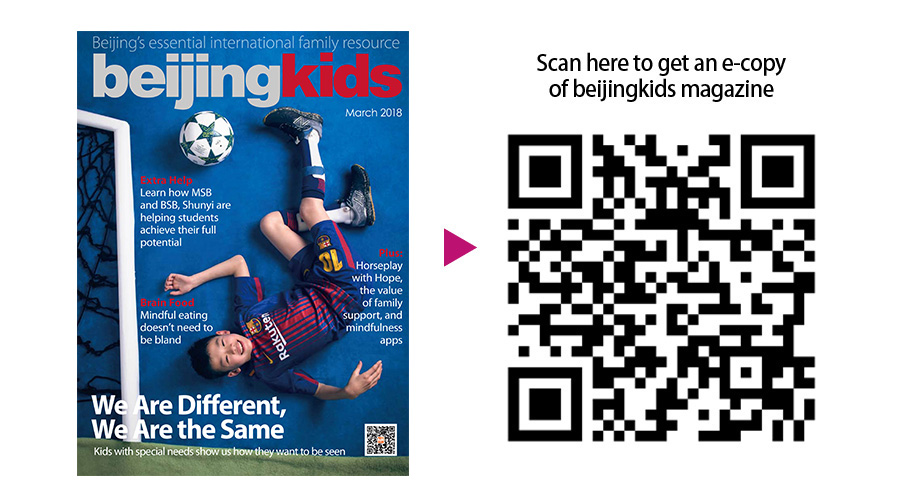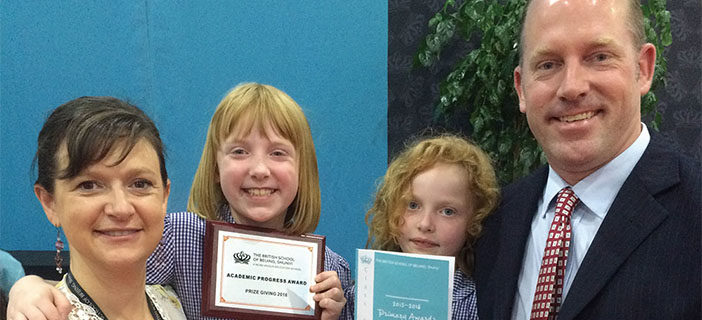
Nicole Washko graduated from Oklahoma City University, and originally came to China in 1998 as a student, thinking she would only be here for a short while! Since then she’s lived in Shanghai and Singapore as well as Beijing, and she’s now Director of Admissions and Marketing at The British School of Beijing, Shunyi (BSB Shunyi). Her husband Travis works at the school too, as Director of Sport and PE, and their daughters are students there: Madison is 10 and Riley 8.
When did you first notice your child was different? What was your reaction?
It wasn’t really me who noticed anything different but rather friends and teachers. Being my first child, I did not notice that my daughter was far ahead of an “average” child when speaking. I did not think it was a big deal that she skipped crawling and went straight to walking, wouldn’t walk down the stairs every other foot in reception, or that her drawing skills were so poor in Year 1. It was that amazing Year 1 teacher that said to my husband and me: “Your daughter seems to be struggling in reading and fine motor skills, yet far ahead of her peers in verbal communication. We would like to do a short assessment to see if there is a gap.”
When was your child diagnosed? What was your reaction?
When the short assessment came back with the suggestion of dyslexia, and a recommendation for a full educational psychology assessment by an external party (with a price tag of RMB 20,000-30,000), I felt overwhelmed, and honestly just wanted to go call my mother! As a parent, I don’t want my child to be different or to struggle, so it was hard to accept at first. Lots of discussions ensued: from pregnancy, to birth, to milestones, and a full family history.
What support have you had from family and friends?
I was approached almost immediately by other parents who have had similar situations, and had amazing advice, introductions to Olivia’s Place and Elsa Elliot (educational psychologist), and most importantly the comment that we all need to hear: “I have been there, and it will all be alright”. A lot of online research is available about the large percentage of students that have special educational needs, and that also helped with acceptance of terms and help.
How do you talk to your child about their special needs? What vocabulary do you use?
We had an occupational therapy (OT) assessment completed by Olivia’s Place, followed by OT for a short time, then a separate educational psychology assessment. The psychologist suggested using a slimmed down version of the report without labels, just one that focused on my daughter’s individual learning strengths and weaknesses. The class teacher and the Special Education Needs Inclusion team at BSB, Shunyi made some accommodations for her almost immediately to ensure she is successful at school. Four years on, my older daughter is well aware of her struggles with reading and writing, as well as her strengths, and we have been honest with her, including the terminology used by the teachers.
How do their friends behave with your child? Do they treat them differently or the same?
She had an unfortunate experience in Year 2 when students tried to bully her because of her poor drawing and writing, which could have really damaged her confidence. Luckily for us her class teacher took the student aside and discussed it with the parents, turning it around completely. That child became my daughter’s biggest supporter and is still a close friend.
What challenges do you and your child face now?
My younger daughter was diagnosed much later with a different form of dyslexia which affects auditory processing. Her strengths lie in the written word, a complete opposite from her sister, which makes doing homework at our house a real challenge! Again, like her sister, this was noted by her teacher in Year 3, and she was given a formal educational psychology assessment by the same psychologist as her sister. When doing these assessments, a lot of family background information is needed, so it was helpful to have someone who already knew us and our family. Even though this expert moved outside of China, we chose to take a family trip to Kuala Lumpur just to see her!
What challenges will you and your child face in the future?
Both of my girls will find ways of tackling their challenges through the school years, by using their strengths and by accepting the accommodations that all schools offers students with different learning styles. There will be peaks and valleys in their academic advancement throughout the years and that is what is hard to prepare for.
What positives do you take from your situation?
Because of this experience, I have started a small support group in Shunyi for parents that have children a range of mild educational needs to severe disabilities. We don’t have any groundbreaking activities, but we support each other from day to day by sharing successes or listening to a parent vent as necessary. We also share resources and spend time being generally grateful for all the people in our children’s lives who make a positive difference. The issues we have at my home seem large to me some days, but are nothing compared to what some families go through and that perspective is always needed.

Maggie studied for a master’s degree in the UK, but returned to China to work before becoming a full-time mother. Her husband worked at Tsinghua University after receiving his doctorate, and is now a research and development manager of an entrepreneurial company. Their son Xiao Le (David), age 7, is a first-year student at Olive International School in Beijing.
When did you first notice your child was different? What was your reaction?
I gave birth to my child prematurely when I was 30-months pregnant. He stayed over 30 days in the neonatal intensive care unit, where an MRI test revealed cerebral dysplasia and leukomalacia. The doctor told us it might produce sequelae such as brain paralysis; we should be prepared and implement nursing intervention as soon as possible. I was worried and confused. I didn’t know what his future held. When he was 3 months old, he still couldn’t control his head. He couldn’t turn over his body or raise his head, and he had muscle spasms in all of his limbs.
When was your child diagnosed? What was your reaction?
When he was 3 months old, I took him to the institution for preterm infants. He was diagnosed with cerebral palsy. I didn’t realize how serious it was then. I just thought maybe he would not be as good as others in doing sports. He was so young and I believed that he would be normal if we started taking physical therapy as soon as we could.
How did you choose a school for your child? What factors did you take into consideration?
I began to choose a school for him when he was 6. I didn’t think the education system or philosophy of public schools would suit him, because of his physical difference and his nervous temperament. I hoped to find an international school with love and care, a school offering support teachers and one helpful for his physical and mental development.
What support have you had from family and friends?
My parents did their utmost to help us and encourage us. My child had received acupuncture treatment by the age of 3. My friends introduced several excellent herbalist doctors to me, and they helped a lot when I was choosing international schools for my kid.
How do you talk to your child about their special needs? What vocabulary do you use?
I never told him that he was a cerebral palsy child. I only told him the reason why he couldn’t walk on his own is that his legs and waist lacked strength and had muscle spasms; and if he kept training, he would be able to walk soon. Especially after his operation on his tendons and legs, the muscular tension was reduced and many problems affecting walking were resolved. He was happy to feel the hope.
I don’t like to use disabled to talk about children like him, I prefer to use differently abled. In fact, my child does pretty well in other aspects. Three years ago, I asked a foreign doctor if my child would become normal like others. He asked me several questions. “What kind of people are normal? Is there any criteria for normal? Is your child making progress? If he is making progress, he is normal.” I was moved by his words, and it made me re-examine the issue of special children.
How do their friends behave with your child? Do they treat them differently or the same?
Before he went to school, he didn’t have many friends, and most are my friends’ children. When they played together, some kids asked him why he couldn’t walk. He said because he had an operation and he would be able to walk soon. However, he had few true friends. Last year, after he went to primary school, his classmates liked him and helped him a lot. He likes his classmates too, and is happy every day.
What challenges do you and your child face now?
I quit my job to look after my child after he was born. I totally put myself into raising him and arranging his treatments. It’s stressful for my husband to be a sole breadwinner. And our focus has turned to the child.
David became a first-year student in September, 2017. He gradually got used to school life (he had never been to kindergarten before). At present, the challenges come in two aspects. The first is his schoolwork. His right hand lacks strength to hold a pen and write. He is making progress but still needs to practice. By now, he can write letters and numbers by himself. He tries hard to review and memorize what he learns in class. And we, as parents, also need to soothe him when he has problems. The second challenge is time management. We need to balance the time for learning and treatment.
What challenges will you and your child face in the future?
We will need to find the right direction when we get lost in the future. I need to pay attention to what he cares about, what he likes, to make him happy.
In China or elsewhere, which organizations outside school have provided useful help for you and your child?
In 2011, he had hydrotherapy in Beijing. He swam for one year with Family Box. And he has being swimming with MOOEYSWIM for five years. In 2016, he also received equestrian rehabilitation with Hope.
What positives do you take from your situation?
I used to think the child is my burden, but now, I just want to raise him well and give him a good example. He is not my burden, but my comfort. When God closes a door for you, he will open a window. I want him to learn to be himself regardless of what others think about him.

Photos: Courtesy of Nicole Washko, Maggie
This article appeared on p40-41 of beijingkids March 2018 issue.




